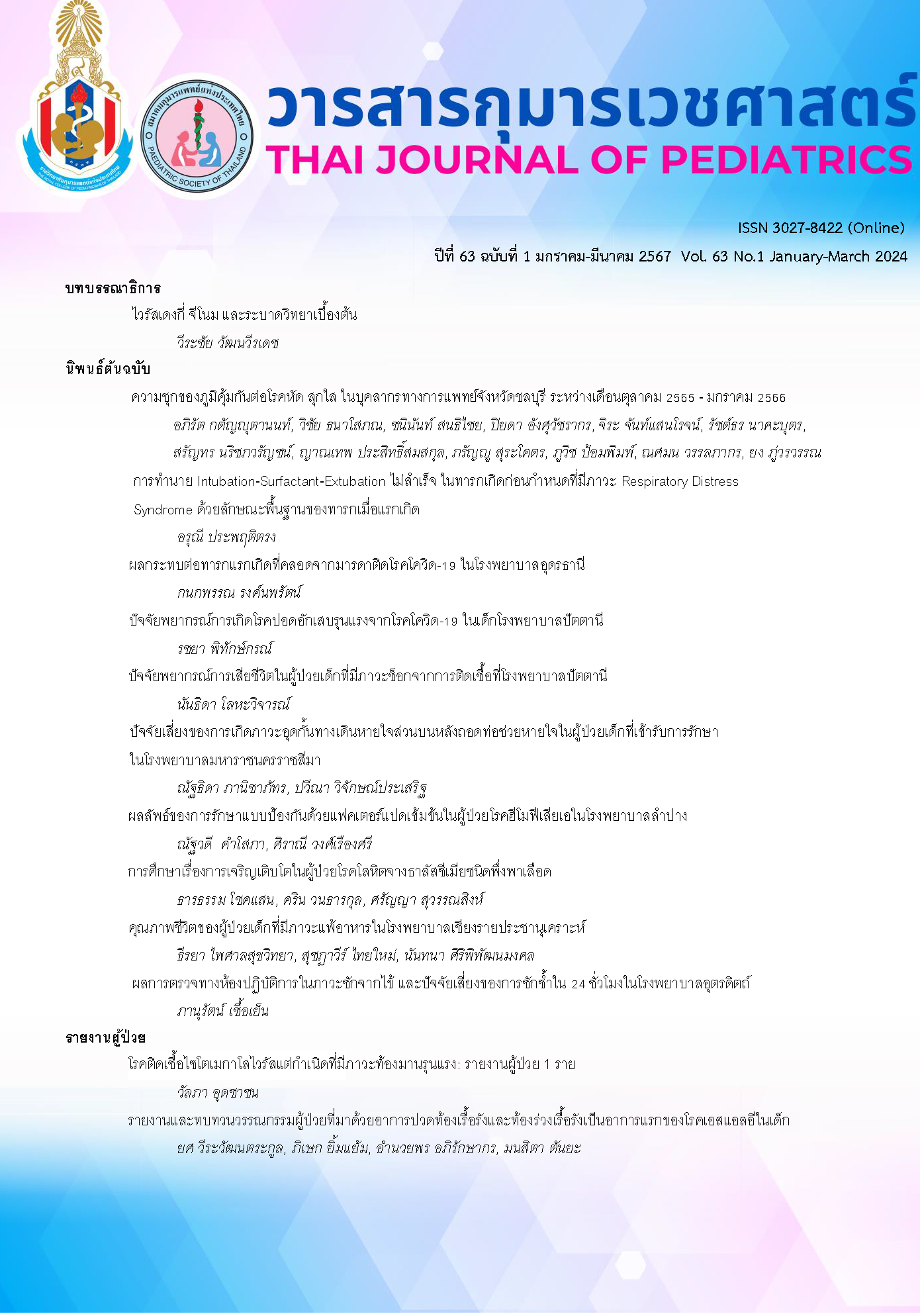คุณภาพชีวิตของผู้ป่วยเด็กที่มีภาวะแพ้อาหารในโรงพยาบาลเชียงรายประชานุเคราะห์
คำสำคัญ:
ภาวะแพ้อาหาร , คุณภาพชีวิต , ผู้ป่วยเด็ก , ครอบครัวบทคัดย่อ
ความเป็นมา: ภาวะแพ้อาหารกำลังเป็นปัญหาด้านสุขภาพทั่วโลก และส่งผลกระทบอย่างมากต่อทั้งผู้ป่วยเด็กและครอบครัว ทั้งต่อร่างกายและอารมณ์
วัตถุประสงค์: เพื่อศึกษาคุณภาพชีวิต (QoL) ของผู้ป่วยเด็กที่มีภาวะแพ้อาหาร และศึกษาปัจจัยเสี่ยงที่เกี่ยวข้องกับการมีคุณภาพชีวิตที่แย่กว่าในกลุ่มเด็กที่มีภาวะแพ้อาหารของจังหวัดเชียงราย
วิธีการศึกษา: เป็นการวิจัยแบบตัดขวาง โดยเก็บข้อมูลในผู้ป่วยเด็กอายุ 0-12 ปีที่มีภาวะแพ้อาหาร ที่มาเข้ารับการรักษาที่หอผู้ป่วยนอกแผนกกุมารเวชกรรม คลินิกโรคภูมิแพ้เด็ก โรงพยาบาลเชียงรายประชานุเคราะห์ที่เข้าเกณฑ์การคัดเลือกเข้าร่วมงานวิจัย โดยสัมภาษณ์ผ่านแบบสอบถามคุณภาพชีวิตภาวะแพ้อาหาร - แบบฟอร์มผู้ปกครอง ฉบับภาษาไทย (the Food Allergy Quality of Life Questionnaire-Parent Form : FAQLQ-PF) แบ่งออกเป็น 3 ส่วน คือ ผลกระทบทางอารมณ์ (EI) ความวิตกกังวลด้านอาหาร (FA) และข้อจำกัดทางสังคมและอาหาร (SDL) อายุของผู้เข้าร่วมแบ่งออกเป็น 3 กลุ่มคือ 0-3 ปี, 4-6 ปี และ 7-12 ปี เปรียบเทียบคะแนนโดยใช้โปรแกรม Stata เวอร์ชัน 14.2
ผลการศึกษา: จากการศึกษานี้พบว่ามีผู้เข้าร่วมการศึกษาวิจัย โดยการตอบแบบสอบถามจำนวน 75 คน โดยมีอายุเฉลี่ย 3.6 ± 0.3 ปี คะแนน FAQLQ-PF เฉลี่ยอยู่ที่ 1.92 ± 1.23 ซึ่งแสดงว่าการมีภาวะแพ้อาหารส่งผลกระทบน้อยมากต่อคุณภาพชีวิตของผู้ป่วยเด็กที่มีภาวะแพ้อาหารในจังหวัดเชียงราย อย่างไรก็ตาม ปัจจัยที่ส่งผลกระทบต่อคุณภาพชีวิตที่แย่ลงนั้น ได้แก่ ผู้ป่วยที่ได้รับการวินิจฉัยว่ามีภาวะแพ้อาหารในช่วงอายุ 7-12 ปี, ความถี่ของการเกิดอาการแพ้, การแพ้อาหารหลายชนิด และการมีโรคประจำตัวอื่นร่วมด้วย ในการศึกษานี้ พบว่าอาหารที่เด็กแพ้มากที่สุด ได้แก่ ไข่ขาว และประเภทของอาหารที่แพ้ไม่ส่งผลต่อคุณภาพชีวิตของผู้ป่วยเด็กในทุกด้าน
สรุป: คุณภาพชีวิตของเด็กที่แพ้อาหารในจังหวัดเชียงรายค่อนข้างดี โดยเด็กโตที่มีภาวะแพ้อาหารมีผลกระทบต่อคุณภาพชีวิตมากกว่าเด็กเล็กในทุกด้าน
Downloads
เอกสารอ้างอิง
Sicherer SH, Sampson HA. Food allergy: A review and update on epidemiology, pathogenesis, diagnosis, prevention, and management. J Allergy Clin Immunol. 2018;141:41-58.
Santadusit S, Atthapaisalsarudee S, Vichyanond P. Prevalence of adverse food reactions and food allergy among Thai children. J Med Assoc Thai. 2005;88:27-32.
Lao-Araya M, Trakultivakorn M. Prevalence of food allergy among preschool children in northern Thailand. Pediatr Int. 2012;54:238-43.
Jackson KD, Howie LD, Akinbami LJ. Trends in allergic conditions among children [Internet]. United States: NCHS data brief; 2013 [Cited 11 Feb 2023]. Available from: http://www.cdc.gov/nchs/data/databriefs/db121.pdf
Gupta RS, Springton EE, Warrier MR, Smith B, Kumar R, Pongracic J, et al. The prevalence, severity, and distribution of childhood food allergy in the United States. Pediatrics. 2011;128:9-17.
Soller L, Ben-Shoshan M, Harrington DW, Fragapane J, Joseph L, St. Pierre Y, et al. Overall prevalence of self-reported food allergy in Canada. J Allergy Clin Immunol. 2012;130:986-8.
Avery NJ, King RM, Knight S, Hourihane JO. Assessment of quality of life in children with peanut allergy. Pediatr Allergy Immunol. 2003;14:378-82.
Wassenberg J, Cochard M-M, DunnGalvin A, Ballabeni P, Flokstra-de Blok BMJ, Newman CJ, et al. Parent perceived quality of life is age-dependent in children with food allergy. Pediatr Allergy Immunol. 2012;23:412-9.
Cummings AJ, Knibb RC, King RM, Lucas JS. The psychosocial impact of food allergy and food hypersensitivity in children, adolescents, and their families: a review. Allergy. 2010;65:933-45.
Ravid NL, Annunziato RA, Ambrose MA, Chuang K, Mullarkey C, Sichere SH, et al. Mental health and quality-of-life concerns related to the burden of food allergy. Immunol Allergy Clin North Am. 2012;32:83-95.
Cohen BL, Noone S, Munoz-Furlong A, Sicherer SH. Development of a questionnaire to measure quality of life in families with a child with food allergy. J Allergy Clin Immunol. 2004;114:1159-63.
Thörnqvist V, Middelveld R, Wai HM, Ballardini N, Nilsson E, Strömquistet J, et al. Health-related quality of life worsens by school age among children with food allergy. Clin Transl Allergy. 2019;9:10.
Mizuno Y, Ohya Y, Nagao M, DunnGalvin A, Fujisawa T. Validation and reliability of the Japanese version of the Food Allergy Quality of Life Questionnaire-Parent Form. Allergol Int. 2017;66:290-5.
Manso L, Pineda R, Huertas B, Fernandez-Rivas M, Dieguez MC, Cerecedo I, et al. Validation of the Spanish Version of the Food Allergy Quality of Life Questionnaire-Parent Form (S-FAQLQ-PF). J Investig Allergol Clin Immunol. 2017;27:363-9.
Couto M, Silva D, Piedade S, Borrego L, Flokstra-de Blok B, DunnGalvin A, et al. Translation to Prouguese and cultural adaptation of Food Allergy Quality of Life Questionnaire-Parent Form (FAQLQ-PF). Eur Ann Allergy Clin Immunol. 2016;48:82-7.
DunnGalvin A, Koman E, Raver E, Frome H, Adams M, Keena A, et al. An examination of the Food Allergy Quality of Life Questionnaire Performance in a countrywide American sample of children: cross-cultural differences in age and impact in the United States and Europe. J Allergy Clin Immunol Pract. 2017;5:363-8.
Limpitikul W, Srisuwatchari W, Jirapongsananuruk O, Visitsunthorn N, Pacharn P. Validation and Reliability of the Thai version of the Food Allergy Quality of Life Questionnaire-Parent Form (FAQLQ-PF). Asian Pac J Allergy Immunol. 2023;41:236-43.
Miller J, Blackman AC, Wang HT, Anvari S, Joseph M, Davis CM, et al. Quality of life in food allergic children: Results from 174 quality-of-life patient questionnaires. Ann Allergy Asthma Immunol. 2020;124:379-84.
Ostblom E, Egmar AC, Gardulf A, Lilja G, Wickman M. The impact of food hypersensitivity reported in 9-year-old children by their parents on health-related quality of life. Allergy. 2008;63:211-8.
Annunziato RA, Ma MR, Ba MAA, Bs CM, Shemesh E, Sicherer SH. Longitudinal evaluation of food allergy-related bullying. J Allergy Clin Immunol Pract. 2014;2:639-41.
Jonsson M, Ekström S, Protudjer JLP, Bergström A, Kull I. Living with food hypersensitivity as an adolescent impairs health related quality of life irrespective of disease severity: Results from a population-based birth cohort. Nutrients. 2021;13:2357.
Shemesh E, Annunziato RA, Ambrose MA, Ravid NL, Mullarkey C, Rubes M, et al. Child and parental reports of bullying in a consecutive sample of children with food allergy. Pediatrics. 2013 ;131(1):e10-7.
Hamada K, Nagao M, Imakiire R, Furuya K, Mizuno Y, Sato Y, et al. Factors associated with outcome of egg allergy 1 year after oral food challenge: A good baseline quality of life may be beneficial. Pediatr Allergy Immunol. 2021;32:1490-6.
Samady W, Warren C, Wang J, Das R, Gupta RS. Egg allergy in US children. J Allergy Clin Immunol Pract. 2020;8:3066-73.
Protudjer JL, Jansson SA, Middelveld R, Östblom E, Dahlén SE, Arnlind MH, et al. Impaired health-related quality of life in adolescents with allergy to staple foods. Clin Transl Allergy. 2016;6:37.
Bacharier LB, Boner A, Carlsen KH, Eigenmann PA, Frischer T, Götz M, et al. European Pediatric Asthma Group. Diagnosis and treatment of asthma in childhood: A PRACTALL consensus report. Allergy. 2008;63:5-34.
ดาวน์โหลด
เผยแพร่แล้ว
รูปแบบการอ้างอิง
ฉบับ
ประเภทบทความ
สัญญาอนุญาต
ลิขสิทธิ์ (c) 2024 ราชวิทยาลัยกุมารแพทย์แห่งประเทศไทย และ สมาคมกุมารแพทย์แห่งประเทศไทย

อนุญาตภายใต้เงื่อนไข Creative Commons Attribution-NonCommercial-NoDerivatives 4.0 International License.



